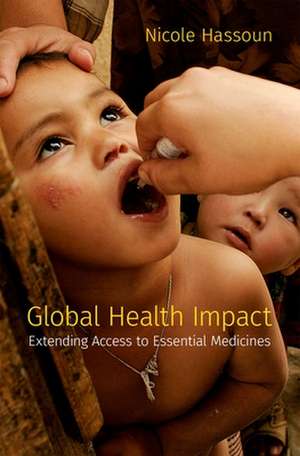Global Health Impact: Extending Access to Essential Medicines
Autor Nicole Hassounen Limba Engleză Hardback – 17 sep 2020
Preț: 223.91 lei
Preț vechi: 240.27 lei
-7% Nou
Puncte Express: 336
Preț estimativ în valută:
42.86€ • 44.08$ • 35.56£
42.86€ • 44.08$ • 35.56£
Carte disponibilă
Livrare economică 14-20 ianuarie
Livrare express 11-17 ianuarie pentru 50.75 lei
Preluare comenzi: 021 569.72.76
Specificații
ISBN-13: 9780197514993
ISBN-10: 0197514995
Pagini: 318
Dimensiuni: 236 x 163 x 28 mm
Greutate: 0.64 kg
Editura: Oxford University Press
Colecția OUP USA
Locul publicării:New York, United States
ISBN-10: 0197514995
Pagini: 318
Dimensiuni: 236 x 163 x 28 mm
Greutate: 0.64 kg
Editura: Oxford University Press
Colecția OUP USA
Locul publicării:New York, United States
Recenzii
This important interdisciplinary book will be well received by its target audience of scholars with at least working knowledge of rights-based ethics and health policy.
Global Health Impact is an excellent exploration of core issues in global health ethics and proof of concept for the scientifically rigorous, policy-oriented philosophy and philosophically-informed policy Nicole Hassoun champions therein. The book builds on more than a decade of Hassoun's important philosophical and empirical work on health/healthcare ethics and politics and contributes to multiple fields, including ethics, political philosophy, law, and public policy. Hassoun's arguments deserve close attention.
In this highly impressive work Nicole Hassoun makes a compelling case for the human rights to health and to access essential medicines, arguing that consumers have responsibilities to purchase in ways that support such rights. She develops a sophisticated proposal through her Global Health Impact initiatives, which are strongly grounded in both theory and practice. A masterful blend of philosophical and empirical work, Global Health Impact shows how engaged philosophy can inform progressive policy in our contemporary world.
Global Health Impact reveals in gripping detail the human cost of inaccessible, unaffordable essential medicines. Everyone has an equal right to survive and to thrive, but our world isn't designed that way. Hassouns ideas are transformative. She tugs at our social conscience. She provides a powerful tool for social action. Want to understand why the worlds poor cant access essential medicines? Want a plan to secure health justice? Read Hassouns powerful book.
Nicole Hassoun addresses issues related to global justice, the right to health in general, and the right to essential medicine. She relates philosophical debates to policy, and makes policy debates theoretically coherent. She should be commended for a creative initiative and a willingness to come up with an interesting idea for how to improve access to essential drugs for the global poor. Her approach is interdisciplinary and engages well with people's growing interest in what individuals can do in response to global injustice.
This is a timely book on an important topic. It makes a significant contribution to the debate on ethics in global health by focusing on measuring the global health impact of different drugs, and the companies that produce them. Her claims are bold and well-argued.
Global Health Impact is an excellent exploration of core issues in global health ethics and proof of concept for the scientifically rigorous, policy-oriented philosophy and philosophically-informed policy Nicole Hassoun champions therein. The book builds on more than a decade of Hassoun's important philosophical and empirical work on health/healthcare ethics and politics and contributes to multiple fields, including ethics, political philosophy, law, and public policy. Hassoun's arguments deserve close attention.
In this highly impressive work Nicole Hassoun makes a compelling case for the human rights to health and to access essential medicines, arguing that consumers have responsibilities to purchase in ways that support such rights. She develops a sophisticated proposal through her Global Health Impact initiatives, which are strongly grounded in both theory and practice. A masterful blend of philosophical and empirical work, Global Health Impact shows how engaged philosophy can inform progressive policy in our contemporary world.
Global Health Impact reveals in gripping detail the human cost of inaccessible, unaffordable essential medicines. Everyone has an equal right to survive and to thrive, but our world isn't designed that way. Hassouns ideas are transformative. She tugs at our social conscience. She provides a powerful tool for social action. Want to understand why the worlds poor cant access essential medicines? Want a plan to secure health justice? Read Hassouns powerful book.
Nicole Hassoun addresses issues related to global justice, the right to health in general, and the right to essential medicine. She relates philosophical debates to policy, and makes policy debates theoretically coherent. She should be commended for a creative initiative and a willingness to come up with an interesting idea for how to improve access to essential drugs for the global poor. Her approach is interdisciplinary and engages well with people's growing interest in what individuals can do in response to global injustice.
This is a timely book on an important topic. It makes a significant contribution to the debate on ethics in global health by focusing on measuring the global health impact of different drugs, and the companies that produce them. Her claims are bold and well-argued.
Notă biografică
Nicole Hassoun is Professor of Philosophy at Binghamton University and Visiting Scholar at Cornell University. She co-directs the Institute for Justice and Well-Being and is affiliated with the University of Pittsburgh's Center for Bioethics and Health Law. She is the author of Globalization and Global Justice (Cambridge University Press 2012), and has published widely in journals including American Philosophical Quarterly, Journal of Development Economics, PLoS One, The European Journal of Philosophy, American Journal of Tropical Medicine and Hygiene, and The Australasian Journal of Philosophy.
